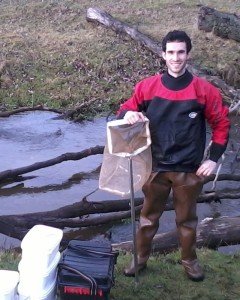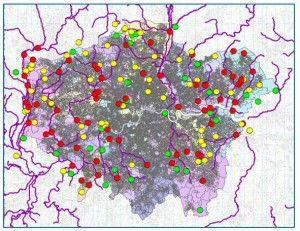Meet the Team: Research Assistant
31st March 2016
Another chance to Meet the Team, and this time to say thank you and farewell to our research assistant, Luis.
 Tell me your name…
Tell me your name…
Luis Moliner Cachazo
And your job title?
Research Assistant
What does that involve?
Basically I help in everything I can but my main task is to sort samples from ponds and rivers and then identify the aquatic macroinvertebrates present in them to species level. I have also participated in the Freshwater Watch project, taking water samples around Greater London for nitrates and phosphates analysis and I carry out the sediment analysis for the Water Friendly Farming project twice a week.
 One of the cleanest water bodies found in the Freshwater Watch project – a pond of course.
One of the cleanest water bodies found in the Freshwater Watch project – a pond of course.  Nutrient levels were measures in water bodies across Greater London: green = clean, yellow = moderately polluted, red = heavily polluted
Nutrient levels were measures in water bodies across Greater London: green = clean, yellow = moderately polluted, red = heavily polluted
What’s so important about that?
The composition and distribution of a waterbody’s invertebrate community give us a clear idea about the health of the ecosystem, there are species very sensitive to pollution that can act as indicators of the water quality, if these are absent or we only find the very tolerant ones it means that it might be some kind of water pollution. Moreover, we are also interested in knowing if some endangered or rare species could be present in our waterbody.
What is your favourite part of your job?
I love sampling and all related with staying in the field, it can be tough sometimes but for me there is nothing like being in contact with nature and visiting some hidden and lovely spaces that perhaps you wouldn’t go to. It´s also rewarding for me to discover less common species in between all the branches, leaves, etc. when I am sorting.
And least favourite?
Although I love my job there is always something that you like less and this could be spending hours in front of the computer inputting data on spreadsheets, my eyes are very used to the microscope but not to the laptop screen.
Why do you do it? What do you get out of it, and what keeps you going through the hard days?
For me is absolutely vocational, I wanted to be a biologist since I was just six years old when I started to read stories about British naturalists of the 19th Century and when I saw amazing pictures of nature in many books that surrounded me at my parent’s house.
I like to work in an organization where people are so passionate about what they do and really care about nature. I think is very rewarding to see that what I do could contribute to a better understanding of how freshwater ecosystems work and therefore how we can protect them better and help to increase their biodiversity.
What does freshwater wildlife mean to you?
It has something mysterious that I find quite attractive, think about a heron camouflaged waiting for a fish in a misty pond at dawn, or when many times we pass by a river, small stream or a pond without realizing about all the movement that is under the water surface.
What’s your favourite freshwater habitat?
It´s difficult for me to say just one, I come from a region in North West Spain plenty of beautiful rivers and streams running through green forests which is called “the land of thousand rivers”, there are beautiful stream pools but ponds are not very common so when I came to this country I was amazed with the huge number of them!
What got you interested in freshwater habitats?
I knew that I wanted to be an ecologist since long time ago but it wasn’t until my master’s degree when I discovered the world of macroinvertebrates, I will never forget when I went to sample for the first time to a river and I saw all that creatures crawling in the white plastic tray or when I observed a caddisfly case under the microscope for the first time.
